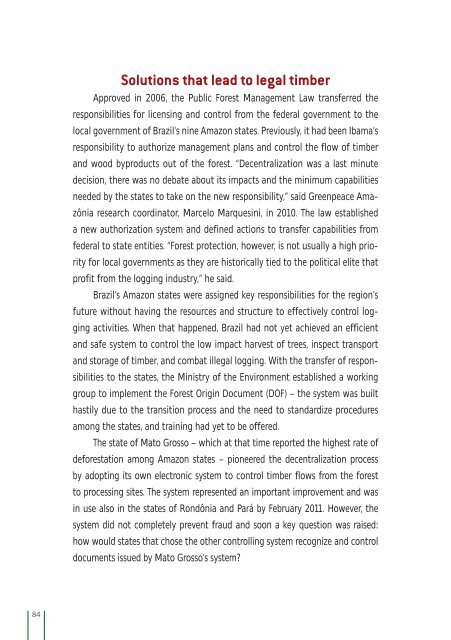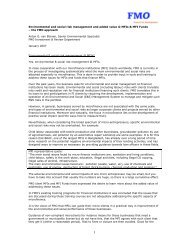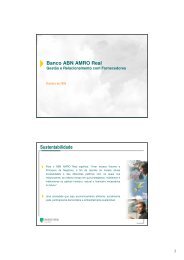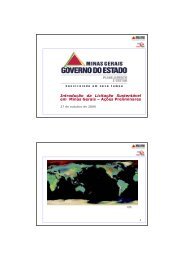From the forest to the consumer - GVces - Fundação Getulio Vargas
From the forest to the consumer - GVces - Fundação Getulio Vargas
From the forest to the consumer - GVces - Fundação Getulio Vargas
You also want an ePaper? Increase the reach of your titles
YUMPU automatically turns print PDFs into web optimized ePapers that Google loves.
84<br />
Solutions that lead <strong>to</strong> legal timber<br />
Approved in 2006, <strong>the</strong> Public Forest Management Law transferred <strong>the</strong><br />
responsibilities for licensing and control from <strong>the</strong> federal government <strong>to</strong> <strong>the</strong><br />
local government of Brazil’s nine Amazon states. Previously, it had been Ibama’s<br />
responsibility <strong>to</strong> authorize management plans and control <strong>the</strong> flow of timber<br />
and wood byproducts out of <strong>the</strong> <strong>forest</strong>. “Decentralization was a last minute<br />
decision, <strong>the</strong>re was no debate about its impacts and <strong>the</strong> minimum capabilities<br />
needed by <strong>the</strong> states <strong>to</strong> take on <strong>the</strong> new responsibility,” said Greenpeace Amazônia<br />
research coordina<strong>to</strong>r, Marcelo Marquesini, in 2010. The law established<br />
a new authorization system and defined actions <strong>to</strong> transfer capabilities from<br />
federal <strong>to</strong> state entities. “Forest protection, however, is not usually a high priority<br />
for local governments as <strong>the</strong>y are his<strong>to</strong>rically tied <strong>to</strong> <strong>the</strong> political elite that<br />
profit from <strong>the</strong> logging industry,” he said.<br />
Brazil’s Amazon states were assigned key responsibilities for <strong>the</strong> region’s<br />
future without having <strong>the</strong> resources and structure <strong>to</strong> effectively control logging<br />
activities. When that happened, Brazil had not yet achieved an efficient<br />
and safe system <strong>to</strong> control <strong>the</strong> low impact harvest of trees, inspect transport<br />
and s<strong>to</strong>rage of timber, and combat illegal logging. With <strong>the</strong> transfer of responsibilities<br />
<strong>to</strong> <strong>the</strong> states, <strong>the</strong> Ministry of <strong>the</strong> Environment established a working<br />
group <strong>to</strong> implement <strong>the</strong> Forest Origin Document (DOF) – <strong>the</strong> system was built<br />
hastily due <strong>to</strong> <strong>the</strong> transition process and <strong>the</strong> need <strong>to</strong> standardize procedures<br />
among <strong>the</strong> states, and training had yet <strong>to</strong> be offered.<br />
The state of Ma<strong>to</strong> Grosso – which at that time reported <strong>the</strong> highest rate of<br />
de<strong>forest</strong>ation among Amazon states – pioneered <strong>the</strong> decentralization process<br />
by adopting its own electronic system <strong>to</strong> control timber flows from <strong>the</strong> <strong>forest</strong><br />
<strong>to</strong> processing sites. The system represented an important improvement and was<br />
in use also in <strong>the</strong> states of Rondônia and Pará by February 2011. However, <strong>the</strong><br />
system did not completely prevent fraud and soon a key question was raised:<br />
how would states that chose <strong>the</strong> o<strong>the</strong>r controlling system recognize and control<br />
documents issued by Ma<strong>to</strong> Grosso’s system?








